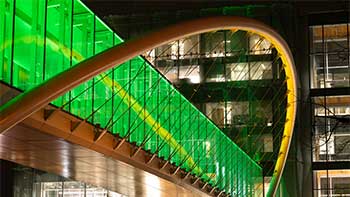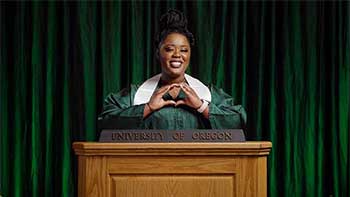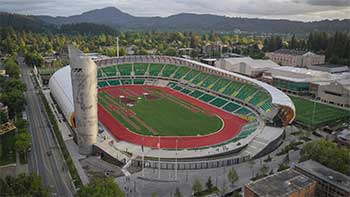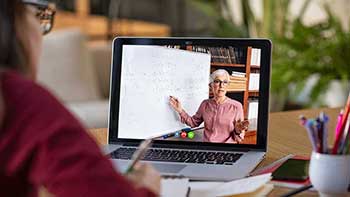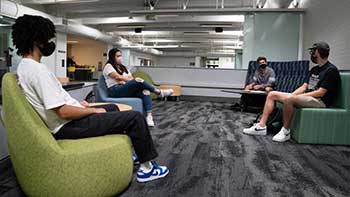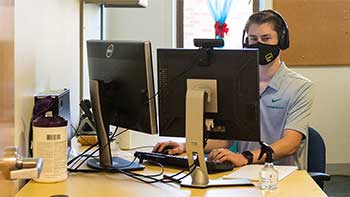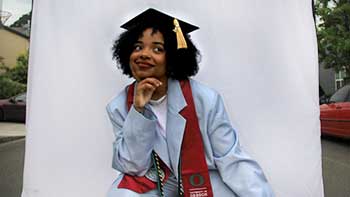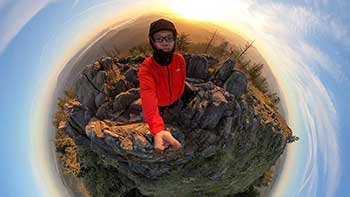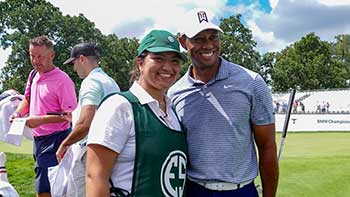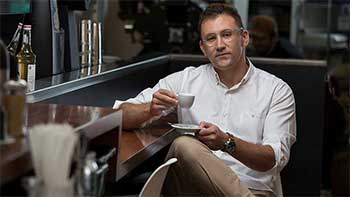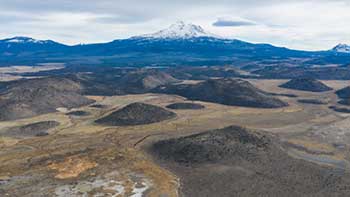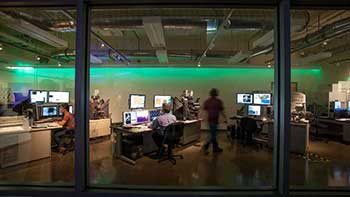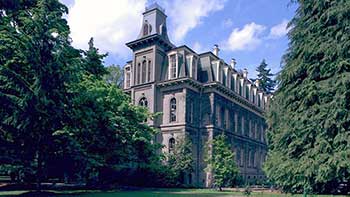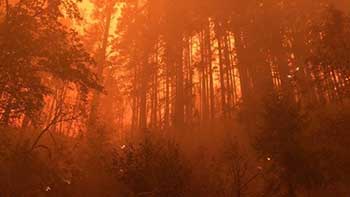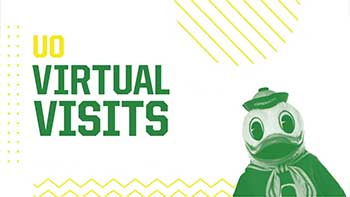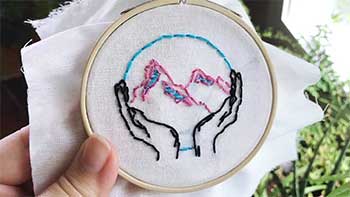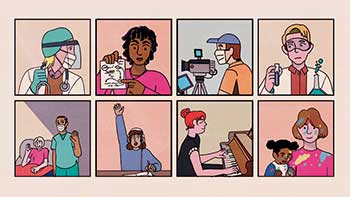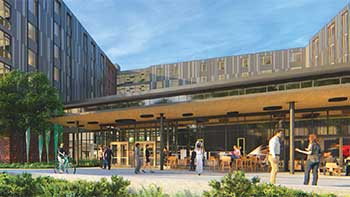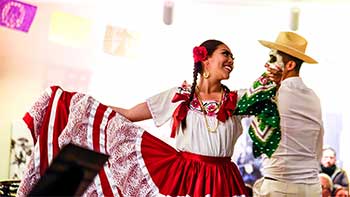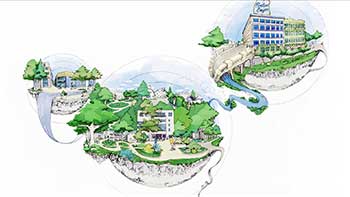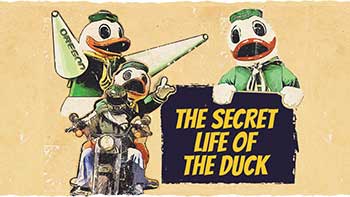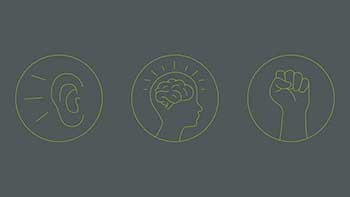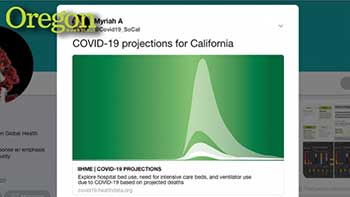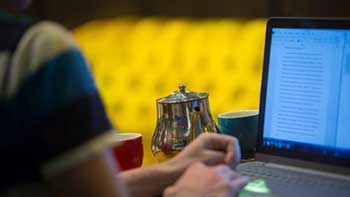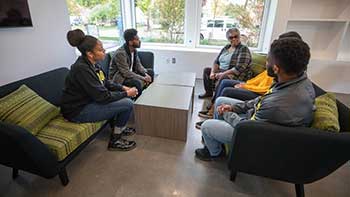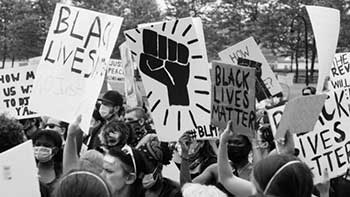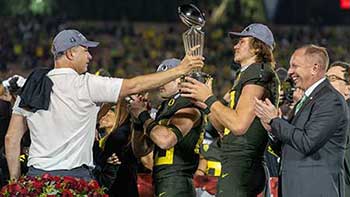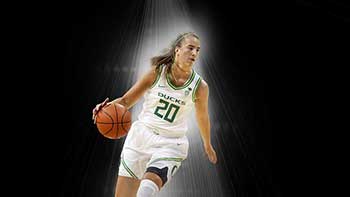First published in Around the O on December 28, 2020
A Year Like No Other
STORY BY TIM CHRISTIEAmid a pandemic, racial reckoning, and catastrophic wildfires, UO students persevered, and faculty and staff helped take on the challenge of COVID-19
On the first day of 2020, the Oregon Ducks were playing football in the glorious afternoon sunshine in Pasadena, Calif., beating the Wisconsin Badgers in the Rose Bowl to cap off a 12-2 season in what seemed an auspicious start to the new year.
Half a world away, a novel coronavirus had quietly begun its deadly spread and would soon become a pandemic that has killed some 1.5 million around the globe and upended nearly every facet of daily life. As the year ends, the virus continues its lethal march, even as the first Americans began getting vaccinated.
For a university, a place where tens of thousands of students are accustomed to sleeping, eating, studying and playing in close quarters, the virus known as COVID-19 would bring about unprecedented upheaval.
The racial reckoning that gripped the country in the wake of the killing of George Floyd spurred activism on the UO campus in a demand that Black Lives Matter. A contentious election and cataclysmic wildfires intensified the anxiety and capped a year that defied comparison.
Along the way, the UO community came together, proving with grit and determination to persevere and contribute. We sent another newly minted class of graduates out into the world. Our scientists developed COVID-19 testing facilities capable of quickly processing thousands of tests per week and continued to help us understand how the pandemic was affecting the world. We celebrated the opening of the Phil and Penny Knight Campus for Accelerating Scientific Impact, a ground-breaking facility dedicated to the mission of quickly turning scientific discoveries into innovations that improve the quality of life for people in Oregon, the nation, and the world.
But the pandemic set the agenda for 2020. It brought an abrupt end to winter term, halting winter sports and causing a sudden, unsatisfying end to seasons. It was a particularly bitter pill for Oregon women’s basketball and their fans: The Ducks were a dominant squad on the cusp of a national title run, led by guard Sabrina Ionescu, a record-smashing force of nature who became the most celebrated college player in the country.
Spring term took place on a mostly empty campus, as students and faculty adjusted to remote learning. For the first time, commencement, the culminating celebration of the academic year, was a virtual affair, taking place on our screens instead of inside a raucous Matthew Knight Arena.
In June, in the wake of nationwide demonstrations protesting police brutality and demanding racial justice, the UO Board of Trustees decided to strip Matthew Deady’s name from the first building on campus because of his racist views, a long-simmering issue. Deady, a federal judge, was president of the state of Oregon’s constitutional convention, which excluded blacks from the state, and the first president of the UO’s Board of Regents.
Also in June, after a teach-in at Deady Hall, protestors marching through campus toppled two iconic pioneer statues in the middle of campus that had been criticized for representing historic white oppression and genocide of native peoples in Oregon.
As fall term was set to begin in late September, ferocious wildfires tore through Oregon and much of the West, destroying scores of buildings, displacing hundreds of thousands and killing dozens. While Eugene was never in peril, a pall of choking smoke spread like a blanket over our communities for days on end.
As this disaster was unfolding, students moved into residence halls and classes began, albeit mostly remote. Students and faculty adjusted to the new abnormal, connecting via social media and video conferencing.
Pac-12 football was delayed, canceled, then revived, and as of this writing, a truncated, COVID-marred season was staggering through its final weeks.
Our scientists and researchers came to the fore, ramping up testing and making it available for free to the community at large. Faculty members and health leaders established the Corona Corps, a cadre of students who conducted contact tracing to help slow the spread of the virus in our community. Our students persisted, learning new ways to learn and connect.
This was our pandemic year. As we look ahead to 2021, there are positive signs: Vaccines developed in record time have begun to be administered as the year comes to a close. While the virus isn’t going away, 2020 will soon be in the rear-view mirror, and there is hope we’ll see a return to some semblance of normalcy in the new year.
CELEBRATIONS
90
5,063
5
OUR PANDEMIC YEAR
16,577
≈50
≈85%
LIFE OF STUDENTS
4,560
60.7%
32
DISCOVERIES
$126M
573
8
BATTLING THE VIRUS
25K
8,623
5,490
TUMULTUOUS TIMES
144
100%
173K
THE VIRTUAL LIFE
20,195
≈200M
15
CAMPUS LIFE
3
12
13
OREGON STORIES
2
454
2
COMMUNITY COMES TOGETHER
$290.7M
48,631
$1.7M
WIDE WORLD OF SPORTS
28-27
1-2-8
18
STUDENT PROFILES

Milaan Moses
Major: Popular music and dance double major
Year: Third year
Hometown: Riverside, California
Milaan Moses is a Resident Advisor for the performing artist collective in Hamilton Hall’s Academic Residential Community. She also works as the PR director for Dance Oregon and as a teacher’s assistant for a studio art class. Milaan spends her time attending socially distanced dance and music classes, some of the few classes at the UO that are being offered in the hybrid model.
As an RA, Milaan has faced unique challenges because of COVID-19. She has struggled at times to find the balance between being a good RA and friend while also being respectful to herself and her body.
To stay positive, Milaan says, “Every single day, before I go to sleep, I think of what I am thankful for. I try to post on social media and reach out to people with a positive quote. I wake up and am happy about the little things.”
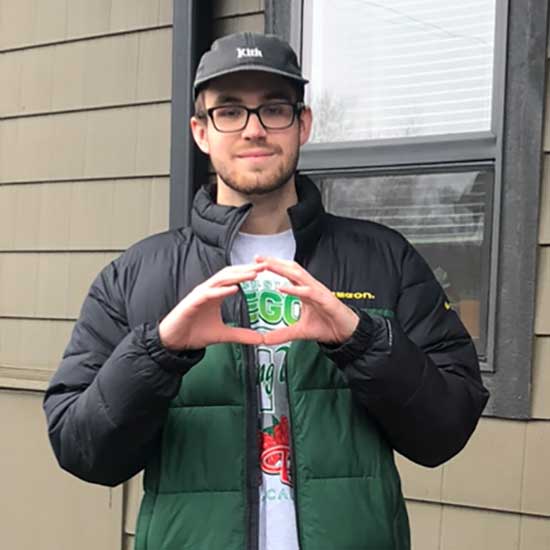
Connor Phillips
Major: Advertising
Year: Third year student, first year transfer
Hometown: Eugene, Oregon
Connor Phillips transferred to the UO this year from Lane Community College. He’s been busy this term, taking six classes, spending more time hiking and camping with his bubble, and doing photography work for a local vintage store.
Connor says J399, a course designed to help transfer students transition into life at the UO, has helped him stay connected.
Connor said forming relationships with his professors has been a challenge this year. Although he says he can create connections through Zoom to some extent, he said it’s a lot easier to drop into an office.
Connor says he looks forward to “being able to be in person, join clubs, do the traditional college stuff like attend games and meet with professors in person. I want to build my community going forward.”
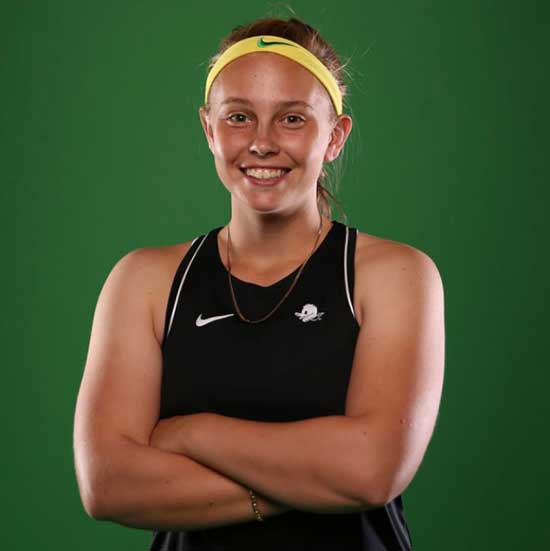
Lilly Mould
Major: Psychology
Year: Second year
Hometown: Birmingham, England
Lilly Mould is on the women’s tennis team at UO, which means practicing six days a week for two to three hours a day. Off the court, she stays busy by spending time with her new dog and working on her Zoom classes.
She admits that she was not expecting for COVID restrictions to be as difficult as they are and she has struggled with not seeing her teammates off the court. Being an international student also comes with it’s own stressors, such as uncertainty over visas and travel restrictions.
Lilly says that she focuses on small positive things instead of waiting for things to get better. She is happy that the tennis team can be together on campus, even if they have to practice with masks on.
“It is a shared experience,” Lilly says. “It is expected for people to be struggling, and seeking help if people do need it is okay.”
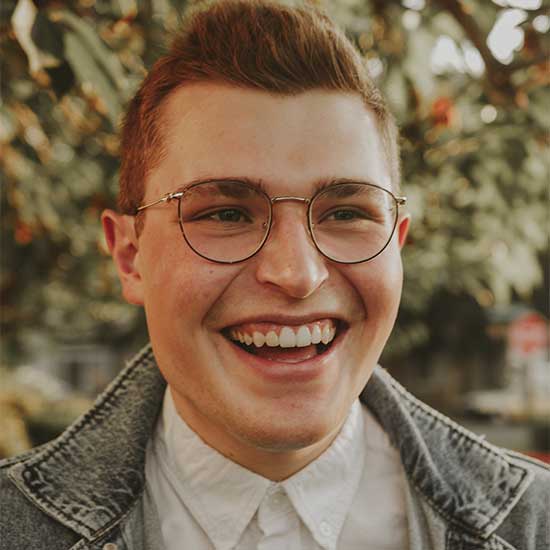
Maxwell Ely
Major: Journalism, public relations, and political science
Year: Second year
Hometown: Beaverton, Oregon
Maxwell Ely has been working this year on a research project with SOJC professor Dave Martowitz to study the language patterns of press secretaries. In his free time Maxwell goes to Netflix watch parties over Zoom, reads books and watches HBO.
Maxwell stays connected by being in touch with people that he met his first year in college. He was part of the Media and Social Action Academic Residential Community and there he met many other students with the same interests.
With asynchronous classes and the added stress of living on his own, Maxwell finds that having a strict daily schedule helps him stay focused and feel less anxious.
“It was hard to do academic things when the world was literally burning” he says, but the issues that have defined 2020 have also made him more engaged with and passionate about political science.
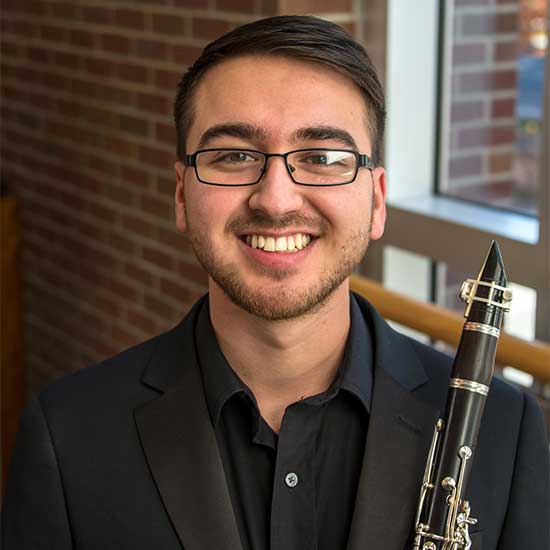
Anthony Aguayo
Major: Musical arts
Year: Third-year PhD student
Hometown: Grants, New Mexico
Anthony Aguayo came to the UO to practice clarinet under Wonkak Kim, one of the leading Korean clarinetists in the world.
Anthony is currently working on the organizing committee of a new colloquium called DA CAPO, a series that will present weekly forums on professional development for musicians and presenters.
As a teacher’s assistant, Anthony admits that teaching over Zoom is difficult, especially when it comes to music. Depending on audio quality, it can be hard to tell what mistakes are being made by students. In addition, Anthony misses interacting with other musicians in an artistic format.
Anthony says he stays positive by “surrounding myself, albeit virtually, with people who are positive and who keep me going.” He also connects with friends online as much as possible. “Also, my little dog!”
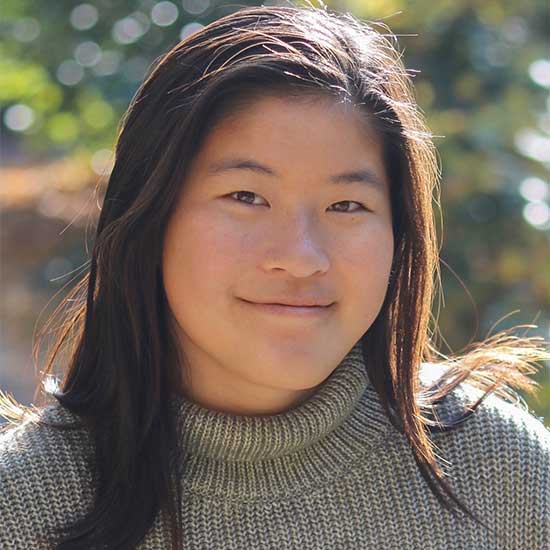
Caitlin Dougherty
Major: Business administration and economics
Year: First year
Hometown: Lake Oswego, Oregon
Caitlin Dougherty says she is enjoying her classes in Clark Honors College and has been creating community by joining clubs like TAMID and the UO women’s rugby club.
Caitlin says that she feels safe living in Global Scholars Hall because she is tested every week and chooses to interact with people she is sure are social distancing.
Although Caitlin has made friends on campus, she feels empathetic for those who are more introverted than herself. COVID anxiety on top of the regular pressures of making friends in a new environment is stressful for many people she knows.
Caitlin says she looks forward to meeting her professors in person. “I really like to learn and I really want to do it in person,” she says. “And I am looking forward to life being normal, but that’s what everybody is looking for.”


